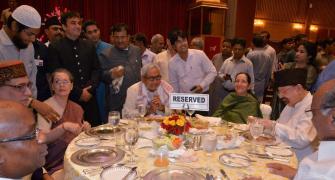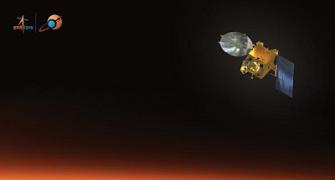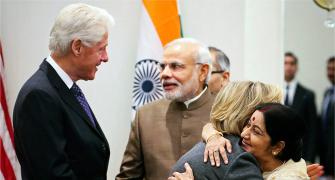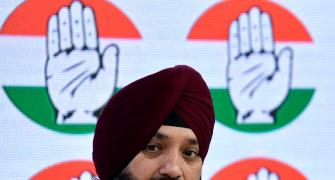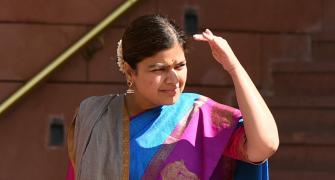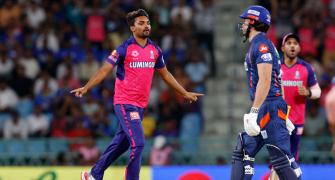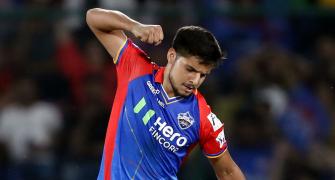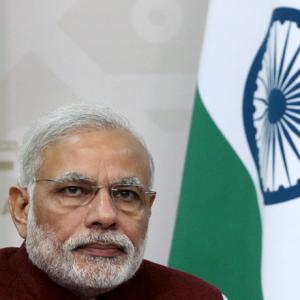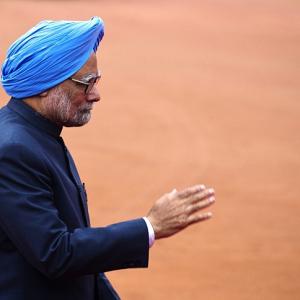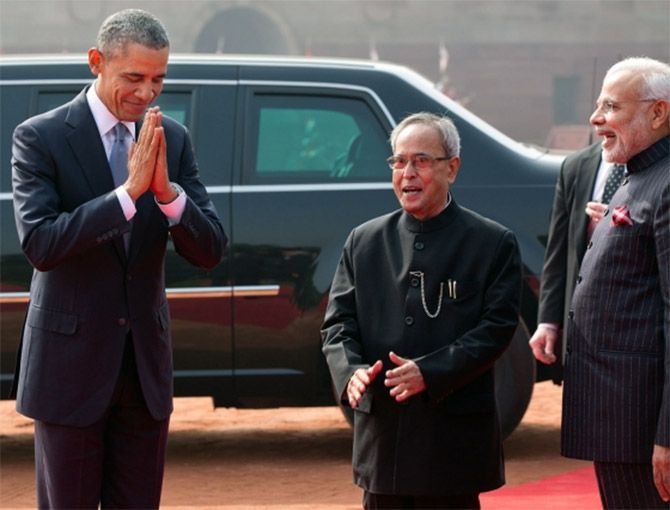
'If you look at the relationship with Pakistan, or the relationship with China, both are today, more uncertain than they were when this government came into power.'
Aziz Haniffa/Rediff.com listens to Shiv Shankar Menon's eloquent report card on the Modi Sarkar's foreign policy.
"The biggest difference in substance," between Dr Manmohan Singh's government and Narendra Modi's government, says former national security advisor Shiv Shankar Menon, "is the doubling down in the relationship with the United States. I would go so far as to actually say, it's a strong pro-Western tilt."
Elaborating, Menon pointed out, "If you look at the things that this government has announced, that the prime minister will go and visit Israel, and no prime minister has done that before" and "if you look at the substance of the relationship with the US, which has been revived," he said these were tangible manifestations.
"The Defence Technology Initiative," he added, "might be something we started in 2012 with (now US Defence Secretary, then deputy defence secretary) Ash Carter, but today, it has real substance. You look at the joint vision statement for the Asia-Pacific, which was issued after President Barack Obama's January visit."
"So, there is certainly a substantive shift there, which is important. And there are other things as well," he said, and noted the "economic thrust behind diplomacy, which was talked about earlier, but is much clearer today in the manner in which foreign policy is being carried out."
"Some of those will have consequences," Menon felt, "since the world is interconnected and some of these consequences are already becoming visible," including to raise the level of trilaterals with Australia and Japan "which has been on and off the agenda for the last eight years."
"If you look at the relationship with Pakistan, or the relationship with China, both are today, more uncertain than they were when this government came into power," Menon, who served as India's envoy to both countries, said.
"How much of this is due to linkage with other relationships, how much of this is due to change of behaviour by the major actors in the changed situation in the Asia-Pacific, I don't know," Menon acknowledged, adding, "That is a matter of debate."
"But the fact is those relationships, which are really critical to India, are more uncertain today."
Menon, who served as foreign secretary before he became national security adviser, began the discussion on India's foreign policy under Prime Minister Narendra Modi at the Asia Society conference in Washington, DC.
"It is clear that there is a remarkable amount of consistency in the substance of the foreign policy of this government over the last year," he said.
Currently a Fisher Family Fellow at the Belfer Centre at Harvard University, Menon said he found this "reassuring because it actually means that India's foreign policy is not a one party foreign policy. It is also therefore, less likely to be flighty. It will be implemented and carried through."
"In that respect," Menon argued, "this government is not different from the previous government," and recalled, "The United Progressive Alliance had carried on many things the National Democratic Alliance had started under (then prime minister Atal Bihari) Vajpayee."
"Each Indian government does this," he said. "They take over successful policy, put their own gloss on it and claim it," but he reiterated that he found this "very reassuring because it makes India a predictable partner in the world to the rest of the world."
"But that doesn't mean there aren't differences," Menon noted, "both in emphasis and in substance from what we've seen before."
"In emphasis," he explained, "there is a much more active projection of the policy, a much clear identification of the persona of the prime minister and you've seen the outreach to the Diaspora."
Menon also spoke of "the use of social media. There are a whole series of examples of this. So, there's a whole lot of energy in the projection of this policy and that's useful because 60 per cent of politics is theatre and you can't avoid that."
"It's hard to measure all these activities by the Modi government," Menon said, "which has been described as 'speed-dating with the major powers'."
"The reason it's hard to measure is because one thing that is missing is a strategic vision -- a framework of foreign policy."
Menon bemoaned the lack of "an overarching foreign policy framework from this government and I have been arguing that they really need to put this up, because then you are no longer reacting to just events or to what other people do."
"Momentums, the successful policy that you carry on from the past, can only carry you so far," he said, "but the world changes and you need to have criteria or metrics by which you measure what is important to you."
"Every Government of India, so far since 1947, has had one single criteria to measure foreign policy," Menon said, "and what is important and what isn't for the transformation of India and that is essential."
"You need to transform India and this government for the first time is much more strident about recognition of India's great power status and that's something that all Indians take for granted -- that India is a great power."
"Until they make it clear what that strategic goal is, how they frame Indian policy,"Menon warned, "it's very hard to say that this policy succeeded or didn't succeed."
Image: US President Barack Obama, alongside President Pranab Mukherjee and Prime Minister Narendra Modi, greets guests at Rashtrapati Bhavan with a Namaste, January 25. Photograph: Pete Souza/The White House

